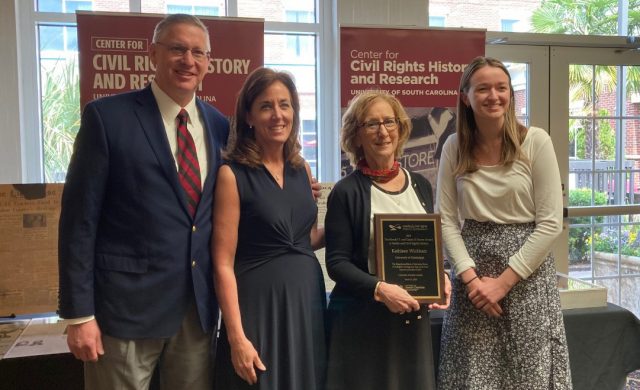
Organizers at the University of South Carolina’s College of Information and Mass Media present Kathleen Wickham (second from right) with the Ronald T. and Gayla F. Farrar Award in Media and Civil Rights History in recognition of her work in civil rights research. Submitted photo
OXFORD, Miss. – The University of South Carolina’s College of Information and Mass Media has recognized University of Mississippi journalism professor and author Kathleen Wickham with the Ronald T. and Gayla F. Farrar Award in Media and Civil Rights History for her work in civil rights research.
The Farrar Award honors journalists whose articles or chapters in an edited collection depict historical relationships between media and civil rights efforts.
“It is a real tribute to Dr. Wickham, who has a long history of doing work related to civil rights that’s been both nationally and internationally recognized,” said Andrea Hickerson, dean of the UM School of Journalism and New Media. “It’s affirming and a wonderful recognition of her body of work.”
Wickham’s 2020 article published in American Journalism, “The Magnifying Effect of Television News: Civil Rights Coverage and Eyes on the Prize,” detailed how Henry Hampton’s award-winning documentary, “Eyes on the Prize” used broadcast journalism and interviews with activists before filming to better understand media’s role in civil rights perception and coverage.
“The famous line that we teach journalism students is, ‘Journalism is the first draft of history,'” Wickham said. “Examining how that history evolves and is recorded is important to the public’s understanding of news events.”
Wickham was chosen as winner of the award in 2021, but the announcement was delayed because of the COVID-19 pandemic. Despite having won the award two years previous, Wickham said she only found out a few weeks before this year’s USC Media and Civil Rights Symposium.
“I was stunned,” Wickham said. “And I was overwhelmed that they recognized my work that I’ve been doing on the topic. I’m very grateful.”
Wickham, who has taught journalism at Ole Miss for 24 years, also received a 2023 research grant from Kappa Tau Alpha to continue researching the role of media in the coverage of civil rights. The grant will allow Wickham to delve into the recently digitized Black newspapers of the civil rights era, which she said have been largely unstudied, unlike their legacy publication counterparts.
“I am so proud of the work that the faculty do here relating to civil rights,” Hickerson said. “It’s important for us to look back to understand who we are and it’s important for students today to understand part of the narrative that they are in right now. They are a part of this legacy.”
